SUMMARY
This is AI generated summarization, which may have errors. For context, always refer to the full article.
![[OPINION] Standing up to a bully](https://www.rappler.com/tachyon/2023/10/TL-south-china-sea-bully-oct-26-2023.jpg)
It is heartening that our Defense Secretary, Gilberto Teodoro, is standing up to the evident bullying of China, which feigned outrage over what in fact was an unwarranted blockade of our supply boats and calling it a “provocation.” The defense secretary called this out as an “obfuscation of the truth,” namely, that China has no right over the disputed waters in the first place, and that the ramming of our boats bearing supplies to a handful of soldiers manning Sierra Madre is not a “slight collision” but an intentional use of brute force by a Chinese maritime militia, one of many such incidents of brazen intimidation in recent years.
China stands on a lie. The Permanent Court of Arbitration in the Hague had already ruled that Ayungin Shoal belongs to the country’s continental shelf. It is about 150 miles from Palawan, well within the 200 nautical miles of the country’s exclusive economic zone, while China’s southernmost coastline is at least 600 miles away. China’s basis for claiming 90% of the South China Sea – its “nine-dash line” – has been declared a historical fiction.
To some analysts, the strong protest of the present government signals a decisive turnabout from the policy of accommodation by the previous regime of Rodrigo Duterte, a weak-kneed position based on an inferiorized mentality that we are small and therefore should align ourselves behind whoever has the goods and the guns if we are to survive.
Some say the country’s newfound assertiveness has raised the risk of a geopolitical war between China and the US, global powers in a contest for supremacy in the region. This is premised on the fact that the Philippines is said to be fronting for the US, whose navigational rights as well as mutual defense treaty with this country makes it a major stakeholder in this conflict. But as the late Foreign Secretary Albert del Rosario has said a year after the PCA ruling, “We cannot allow others to play with the threat of war when our submitted disputes have already been clarified in the ruling.”
More to the point, the prospect of war does not seem likely based on China’s history. Scholars say that China’s strategy of conquest has been annexation, not invasion, like what it did with Tibet and Xinjiang. It has not been known to march across its borders. Instead, it goes about “Sinicizing” its neighbors.
Note, for instance, that China has been deliberately dispersing its population to Southeast Asia. This mass migration is part of its “going out” (zouchugua) strategy to accelerate overseas expansion and commercial acquisitions.
Consistent with its age-old practice of occupying and Sinicizing nearby territories, China is diffusing its influence across the region. It has moved about 2.3 to 2.7 million migrants just in the two decades after 1990. There have been contingents of Hui Muslims migrating to Indonesia and Malaysia, and a large influx of mainland Chinese in Singapore – from several thousands in the 1990’s to one million by 2008, making them the largest and most visible ethnic migrant community in this city state. In this country, unofficial sources say the mainland Chinese, many of them illegal, now number 3 million.
There are reports that mainland Chinese are buying up lands in Palawan, especially in El Nido, which is close to Pag-Asa Island and a major target for unlawful occupation.
More than any other claimant state, the Philippines is of particular interest to China, which is silently acquiring land here because the country’s exclusive economic zone holds half of the gas and oil reserves of the entire South China Sea. China is facing a slowdown in its growth and badly needs these resources to fuel its mammoth industries.
Its “One Belt, One Road” initiative is similarly said to be driven by the prospect of an economic meltdown. While promising that Chinese companies will come and invest and provide jobs to local communities along the revived Silk Road, OBOR is increasingly viewed as motivated by the impulse to centralize power through commercial and civilizational influence, as is happening in Africa and Xi Jinping’s newly-launched “Xivilizational Initiative.”
It is “globalization on China’s terms – creating new markets for China’s firms,” says Brahman Chellaney. It is “the 21st century equivalent of the East India Company, which paved the way for British imperialism in the East.”
Contrary to claims of “historic rights,” China until recently staked no claims on these waters. Not even during the days of the great voyager Zheng He, whose voyages were meant to intimidate and impress allies, adversaries, and those with undecided allegiance, as well as open trade sea lanes between Ming China and Southeast Asia, and all through the Indian Ocean. These were not, as with the Europeans, voyages of exploration to discover new worlds, expand markets, or claim territories for the imperial crown. As a maritime historian puts it, “The economic benefits were secondary to the assertion of Chinese cultural primacy.”
From historical evidence, what there is seems to be “a long history of the region being dominated by sea-faring traders who did not necessarily demonstrate significant territorial aspirations.” Our fishermen, according to the late senator Leticia Shahani, have been fishing quite freely in the rich waters of Bajo de Masinloc since ancient times, just like the others in the littoral states round about.
At this juncture, we are faced with at least two options: one is to behave according to our “heritage of smallness,” as the National Artist Nick Joaquin once put it; or two, to take our place among those nations who, while small, have nevertheless cast significant footprints in the world’s history.
The move to reverse the cowering stance of the Duterte regime is a step in this direction. The international community considers our taking our case to the Hague tribunal as a “game changer.” We have shown that small nations can serve as countervailing force towards balancing the asymmetry of power relations in the region. Through the soft power of legal and meta-legal pressures, we can press for our rights under an evolving maritime order. There is such a thing as a universal “commons,” a rules-based order where all nations, big and small, are being made subject to civilizational norms.
China may refuse to abide by this growing consensus on how nations are to behave in resolving conflict. But it risks being seen as a piratical power patrolling the high seas like a monstrous dragon, no longer a “benign power rising” as in the days of Deng Xiao Ping. – Rappler.com
Melba Padilla Maggay is president of the Institute for Studies in Asian Church and Culture.
1 comment
How does this make you feel?
![[Vantage Point] Xi’s flotilla blocks energy development in South China Sea](https://www.rappler.com/tachyon/2024/04/china-aggression.jpg?resize=257%2C257&crop=442px%2C0px%2C1080px%2C1080px)
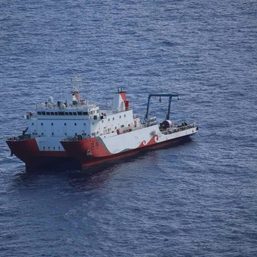
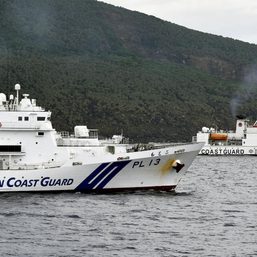

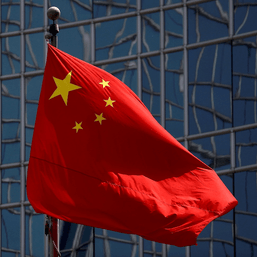
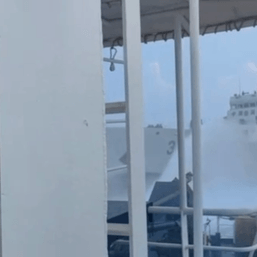

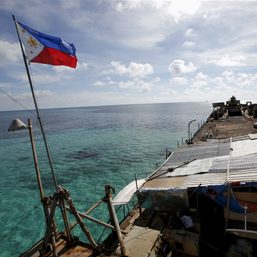
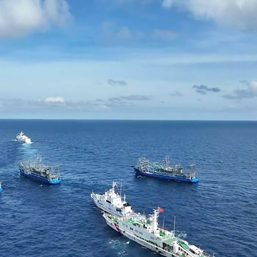
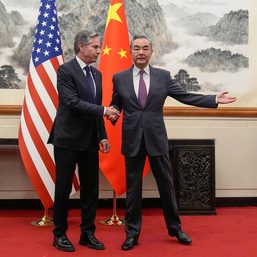
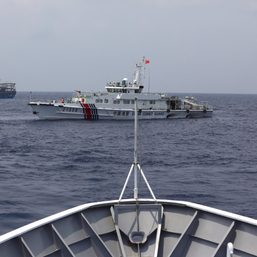

Thanks to Melba Maggay for her inspirational article, “Standing up to a bully.” Firstly, the problem with our “newfound assertiveness” is can our Government keep it up? This is more so considering that we have “enemies from within.” Secondly, indeed, “China stands on a lie” but not to some pro-Chinese Filipinos and more especially to the Chinese Government. For the latter group, it is the other way around: the Philippines stands on a lie. Third and lastly, I believe that China does not only risk “being seen as a piratical power patrolling the high seas like a monstrous dragon”, but rather it is proud to be one.